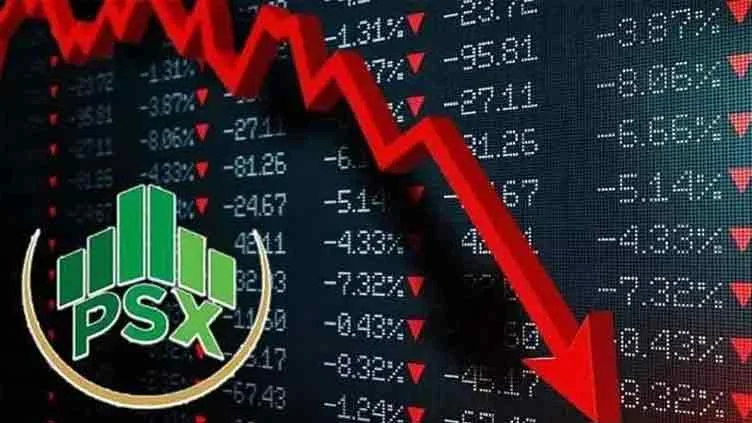Selling Pressure Grips Pakistan Stock Exchange Amid Geopolitical Concerns
The Pakistan Stock Exchange (PSX) experienced selling pressure as geopolitical tensions intensified following the US’s actions against Iran. This situation has amplified investor unease, leading to a significant drop in the benchmark KSE-100 Index, which plummeted by more than 3,900 points during Monday’s intraday trading session.
As of 3:25pm, the KSE-100 Index was recorded at 116,113.50, reflecting a decrease of 3,909.73 points, or approximately 3.26%.
Analyst Remarks
Mohammed Sohail, CEO of Topline Securities, commented that Pakistani stocks began trading with a decline of 1700 points, around 1.4%, influenced by the current tensions involving Iran.
Sector Performance
Widespread selling was evident across various sectors, notably affecting automobile manufacturers, oil and gas exploration firms, OMCs, power generation companies, and commercial banks. Key stocks such as OGDC, PPL, POL, HUBCO, and PSO all experienced declines.
Previous Week’s Market Performance
During the prior week, the PSX faced market instability due to increasing geopolitical tensions in the Middle East, fluctuating international commodity prices, and varied domestic economic signals, which collectively impacted investor confidence.
The KSE-100 Index showed a steep retreat from its recent peak, concluding the week at 120,023.23 points, a 1.7% decrease from the previous week’s closing figure of 122,143.57 points.
Global Market Overview
On the international stage, Asian shares declined on Monday, and oil prices saw a temporary surge to a five-month high. Investors are keenly watching for Iran’s potential response to US actions, mindful of the potential effects on global economic activity and inflation.
Initial market reactions were measured, with only a slight increase in demand for the dollar as a safe-haven asset, and no widespread panic selling was observed.
Oil prices rose by about 2.8%, slightly lower than their initial spikes.
There is some optimism that Iran might moderate its stance following the disruption of its nuclear projects, or that a change in government could lead to a less aggressive administration.
Impact of Geopolitical Factors
The Strait of Hormuz, a narrow passage of approximately 33 km (21 miles) at its narrowest point, is crucial. It facilitates around a quarter of global oil trade and 20% of liquefied natural gas supply.
Brent crude was up by a controlled 2.7% at $79.12 per barrel, while U.S. crude increased by 2.8% to $75.98.
In other commodity markets, gold saw a slight decrease of 0.1%, trading at $3,363 per ounce.
Share markets have demonstrated resilience thus far, with S&P 500 futures decreasing by 0.5% and Nasdaq futures down by 0.6%.
MSCI’s broadest index of Asia-Pacific shares outside Japan fell by 0.5%, while Japan’s Nikkei experienced a 0.9% decline.
European countries and Japan rely significantly on imported oil and LNG, whereas the United States is a net exporter.
This information reflects an update during the trading day.



Comments (0)
No comments yet. Be the first to comment!
Leave a Comment